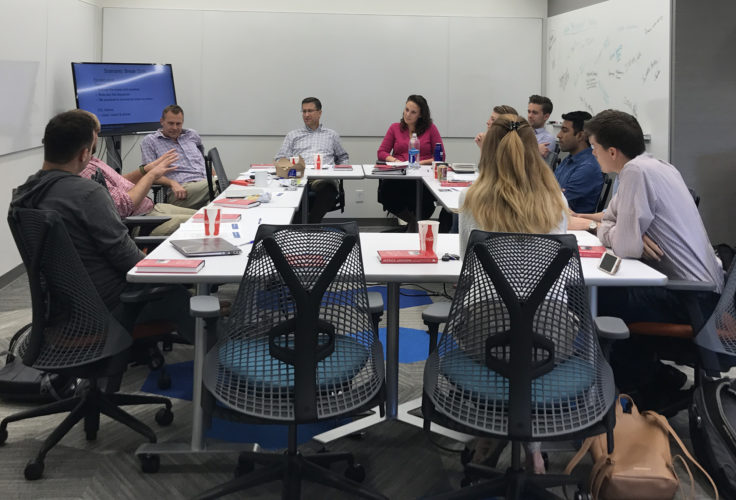Most successful leaders are able to point to a handful of defining moments in their careers – instances that defined the trajectory of their career and their company. Olin’s graduate-level course Defining Moments: Lessons in Leadership and Character from the Top examines these situations by bringing in notable leaders who exemplify both business excellence and personal character.
Perri Goldberg, MBA ’18, wrote this post on behalf of the Bauer Leadership Center.
Managing change—even drastic change—happens more naturally if a company has built a strong, values-based culture, according to Alaina Macia, MBA ’02, president and CEO of Medical Transport Management.
Speaking to Olin’s “Defining Moments” class recently, Macia highlighted the fact that leading a values-driven organization helps eliminate the fear of implementing drastic changes—as long as the changes are aligned with the company strategy, culture, and values.
Macia provided unique perspective as the female leader of a private, family-owned business—particularly because most of the speakers for our “Defining Moments” class have been senior executives of large public corporations.
Macia started her career as a research engineer at the Washington University School of Medicine, following her undergraduate education at WashU focused in biomedical engineering. After a couple of years as a research engineer, Macia realized she was more attracted to business, and enrolled at Olin for her MBA.
Following her MBA, Macia worked at Maritz Inc., but joined Medical Transportation Management, her family-owned business, as an analyst, and was quickly promoted to director of corporate strategy, VP of operations, and finally to president and CEO.
Culture is a touchstone
A key to MTM’s success is its corporate culture, one that fosters successful company growth and an environment in which employees work hard but also have fun. Maintaining that culture is important in the company’s hiring practices, Macia said.
“MTM hires slow, but fires fast,” she said, stressing the importance of hiring the right individuals for the right roles to maintain the company culture and drive success.
I really enjoyed Macia’s focus on the importance of peer-to-peer learning and surrounding yourself with the appropriate individuals at all stages in your career. When she first joined Medical Transportation Management, Macia admitted she did not know everything she needed to know to be successful.
As such, she made it her mission to surround herself with those who could teach her what she didn’t know and support her through decision-making processes, company reorganizations, and dramatic growth spurts.
Finally, one of the biggest takeaways from Macia’s presentation was her emphasis on self-awareness. Understanding your strengths, weaknesses, leadership style, and values will help you understand your colleagues and guide you through your career. Whether you are self-aware or not, she mentioned that it can easily be learned and will only benefit you as a leader.
Macia’s presentation was extremely insightful and a fantastic way to kick off a great class filled with many successful senior executives across all industries.









